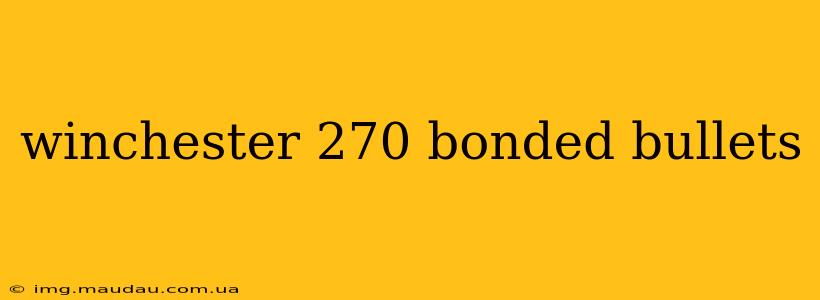The .270 Winchester remains a popular choice for hunters and long-range shooters alike, prized for its accuracy, flat trajectory, and hard-hitting power. Choosing the right ammunition is crucial to maximizing its potential, and bonded bullets have become a significant player in this field. This article will delve into the specifics of Winchester .270 bonded bullets, exploring their construction, performance characteristics, and suitability for various hunting applications.
Understanding Bonded Bullet Construction
Winchester's bonded bullets utilize a unique manufacturing process that fuses the core and jacket of the bullet. This differs from traditional jacketed bullets where the core and jacket are simply joined. The bonding process results in several key advantages:
-
Improved Weight Retention: During impact, bonded bullets are less likely to shed their cores, ensuring consistent penetration and energy transfer even on tough game. This is crucial for ethical and effective hunting.
-
Enhanced Expansion: While retaining weight, bonded bullets are designed to expand reliably upon impact, creating a larger wound channel and increasing stopping power. This is a vital factor for quick, humane harvests.
-
Superior Penetration: The bonded core prevents fragmentation, delivering deeper penetration, making them ideal for larger game animals or shots at longer ranges where bullet integrity is paramount.
Winchester .270 Bonded Bullet Options & Performance
Winchester offers a range of .270 bonded bullets, each tailored to specific hunting needs. While the exact offerings may vary depending on availability, you'll typically find variations focusing on:
-
Bullet Weight: Heavier bullets offer more energy and penetration, suitable for larger game, while lighter bullets provide flatter trajectories ideal for longer shots or smaller animals.
-
Bullet Construction: While all are bonded, subtle differences in jacket material and core composition can affect expansion and penetration characteristics.
-
Ballistic Coefficients: The ballistic coefficient influences how well a bullet resists air resistance, impacting accuracy and effective range. A higher BC means less drop and wind drift at longer distances.
Note: Always refer to the specific product information from Winchester or a trusted retailer for detailed specifications on weight, ballistic coefficient, and performance data. This ensures you select the optimal ammunition for your hunting situation.
Hunting Applications for Winchester .270 Bonded Bullets
Winchester .270 bonded bullets are versatile and suitable for a wide range of game animals, from deer and antelope to elk and larger game, depending on bullet weight and construction. Their superior penetration and weight retention make them an excellent choice for:
-
Thick-skinned game: The bonded construction ensures reliable penetration even through dense bone and hide.
-
Long-range hunting: The consistent performance and reduced bullet deformation maintain accuracy at longer ranges.
-
Ethical hunting practices: The predictable expansion and deep penetration contribute to quick, humane harvests.
Choosing the Right Winchester .270 Bonded Bullet
Selecting the appropriate ammunition requires considering several factors:
-
Game animal: The size and build of the animal dictates the required bullet weight and energy.
-
Shooting range: Longer ranges necessitate bullets with higher ballistic coefficients to minimize trajectory issues.
-
Rifle twist rate: Your rifle's twist rate determines which bullet weights will stabilize properly. Consult your rifle's manual to ensure compatibility.
Conclusion
Winchester .270 bonded bullets offer hunters a reliable and effective option for a wide range of hunting scenarios. By understanding their construction, performance characteristics, and applications, you can make an informed decision and choose the right ammunition to maximize your hunting success. Remember to always prioritize safety and ethical hunting practices when selecting and using any ammunition.
